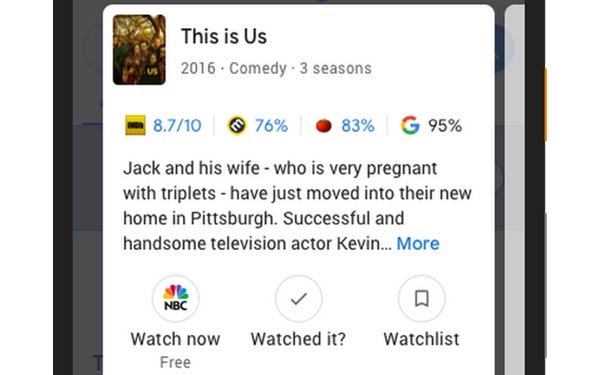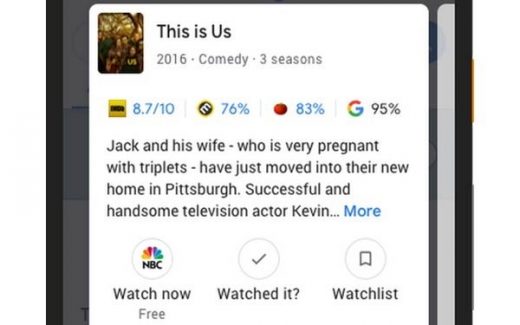Google Now Recommends TV Shows, Movies Based On Data You Feed Its Algorithms
Google Now Recommends TV Shows, Movies Based On Data You Feed Its Algorithms

Google announced Thursday that it will personalize TV and movie recommendations in search. This means the next time you run through the 100 channels on Spectrum or 35 channels on Roku and can’t find anything to watch, a Google search query will tell you “what to watch” or “good shows to watch.”
Matt Sheets, product manager for search at Google, says it’s a way to find recommendations, starting by choosing the TV and movie subscriptions you have. It provides personalized recommendations for what is available to a specific person and enables the person to quickly see where to watch the selected programming.
Beginning today in the U.S., people can search for recommendations on mobile by tapping the start button in the “Top picks for you” carousel to begin rating TV shows and movies. The ratings help Google decide what to serve up as recommendations in the future.
After the search, people can tap on any show or movie to see a full list of providers where the movie or show can be viewed. Or just search for “Watch ‘This is Us,’” for example, to find where it’s available to rent, buy, or watch for free with their subscriptions. For those who pay subscription services online, Google lists what’s available, and can tell them the subscriptions they have to guide them to services.
Based on historic searches, algorithms and clicks to websites, assuming you haven’t cleared your browser, Google will likely turn those recommendations into targeted categories or audience segments for serving up a variety of ads. It reminds me of the debate as to how much influence Google has in our lives in terms of persuasion.
It also reminds me of the decade-old article written by Nicholas Carr for The Atlantic, where he questioned whether Google makes us stupid. “Over the past few years I’ve had an uncomfortable sense that someone, or something, has been tinkering with my brain, remapping the neural circuitry, reprogramming the memory,” he wrote in a piece that ran in The Atlantic. He also acknowledged spending more time online, searching the web on Google.
Other articles followed, posing similar questions that asked whether Google makes us stupid or smart. I don’t think it’s a question of intelligence, but rather a question of pointing people in a specific direction based on the information they have previously shared.
(41)


